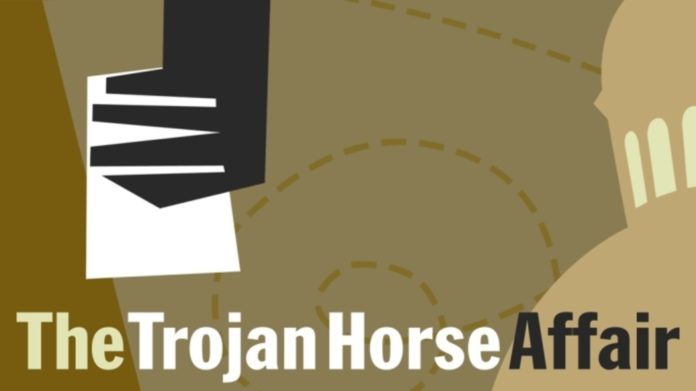Jahangir Mohammed, Director the Ayaan Institute, says the answer to the burning question “Who wrote the Trojan Horse letter?” may lie in good old-fashioned Islamophobia and racism.
The New York Times Podcast on the Birmingham Trojan Horse affair has given life to a dying story. Hamza Syed and Brian Reed are to be commended for their determination to seek out new information.
But whilst they provide some new insights, the answer to the questions they raised: “Who wrote the letter?” and “Who did it seek to benefit?” requires further investigation.
Issues of racism and prejudice such as in the Trojan Horse affair can be better understood through historical memory and experience of anti-racist struggles. On that basis, I draw a different conclusion to that of the journalists (based on their interviews and information already in the public domain).
Racial hoaxes in history
Taken in isolation the racist or prejudiced hoax letter may appear to be the work of individuals with personal grievances inside an organisation. These grievances may often operate alongside a racial hoax.
However, leaflets, letters, publications with elements of prejudice, stereotypes, and conspiracy theory have a long racist history, in the USA, Europe, and pre-Nazi Germany. They have most often been the work of racists or their sympathisers. One of the most notorious was of course the “Protocols of the Learned Elders of Zion” – an entire publication dedicated to a Jewish takeover plot. The hoax or fake conspiracy has also been a standard tactic of racist or right-wing political parties or groups with a racist or anti-Muslim agenda in the UK.
Subscribe to our newsletter and stay updated on the latest news and updates from around the Muslim world!
I have dealt with a few hoaxes myself during a local government career. Hoax letters on council estates in the North of England were used for political gain by those supporting racist parties. One such letter was allegedly from the Home Office, informing the mainly white council tenants that the government was about to resettle new immigrants, and they were required to accommodate them.
These hoaxes and other racist tactics became common, and it is no surprise that the British National Party became a political force in places like Oldham where such tactics were used, and later race riots were provoked. Instigating street violence against minorities is another common racist tactic adopted from Nazi Germany to gain political support.
Later, in charge of a major regeneration programme, I became the victim of an anonymous letter. The letter was sent to the police fraud squad accusing our finance director and myself of fraud. There was also a hint that I was funding Muslim groups to exclusion of others. Both claims were easily evidenced as lies, but the police claimed they had to investigate because public funds were involved.
I had stopped funding certain individuals/groups due to misuse of funds, and therefore was prepared for hostility. I knew whom the content of the letter came from. However, I also told the police officer that the letter could not have been written by the individual I suspected because of the style and language. To my amazement, the police officer told me he already knew who had written it – a white civil servant who was meant to support the local community with capacity building. Yet that individual was never investigated by the police.
9/11 and the perpetuation of anti-Muslim prejudice
After 9/11, and especially after the introduction of Prevent in the UK, prejudices, stereotypes, and accusations of plots became standard in the media (generated by hostile anti-Muslim/Islam groups/websites, political parties, and think tanks). Some of these regularly made complaints to regulators, claiming extremism and links to terrorism.
The political atmosphere meant they would always be taken seriously. Sadly, some Muslims themselves began to accuse others of extremism for personal vendettas and perpetuated prejudices/stereotypes against their own.
Having witnessed many such cases, a familiar pattern begins to emerge. Two examples illustrate the tactics. At a mosque with an attached state-aided faith school, a leaflet was strategically left at the exit from the school via the mosque. The leaflet proclaimed the evils of music according to a very hard-line Islamic view. It was left just before OFSTED inspectors ended their visit, and leaving via the mosque they found the leaflet. The media picked up the story and the school lost its state-aid. It then had to go through a long legal battle to have its status restored.
In another case, a white individual claimed he attended a mosque open day and found a pack of da’wah materials including a CD (allegedly produced by the mosque) with extremist content. The mosque did not produce the material and had no idea who left the materials. However, the story was used to defame the mosque, appeared in the media, and was the subject of a petition to close it down. The individual who claimed he found the material ended up being allowed to make the unsubstantiated accusation on BBC Question Time. The story was widely believed, but no one bothered to investigate the man who claimed he found the leaflet, or if he was linked to any political party and was doing it for political gain.
The Trojan Horse podcast and the anti-Islam narrative
The Trojan Horse podcast brings to public attention characters in this story with prejudices, grievances, and anti-Islam/Muslim agendas, as well as the role of the British Humanist Association (BHA). These should be investigated further.
However, there were other anonymous complainants working with the BHA, the Department of Education, and Ofsted. This is evident from the numerous statements made by the BHA at the time which I have now examined. The first complaint made to BHA was back in 2011 before the hoax letter emerged in November 2013. It is also apparent that the BHA had a concern about Tahir Alam and the MCB’s education strategy predating the Trojan Horse Affair. Peter Clarke in his “investigation” also makes the same links.

Much of what we heard in episode 5, and information in BHA statements from anonymous complainants is pretty standard when schools/organisations that have once been run by white, non-Muslim personnel, transition to becoming more multi-racial/cultural. These types of incidents and complaints have occurred elsewhere in schools, local government, or in the selection of political party candidates.
They can be very bitter, personal and exploit common stereotypes and prejudices about black people, Asians, and Muslims. The Lutfur Rahman case is another example of that (here the plot was labelled “entryism” i.e., Trojan Horse). The judgment, in that case, contains similar racist tropes about Asian involvement in politics.
The podcast exposes the silence of the white people in this tragic failure of “race” and community relations. Their silence and determination to keep the identity of a handful of anonymous aggrieved former staff of Park View School secret, failure to question their motives, or that of the BHA, is telling.
We witness a typical post 9/11 narrative in which the Muslims are assumed guilty until they prove themselves innocent. Whilst the mainly white, non-Muslim prejudices and tropes are considered proven, factual, not to be challenged. Their prejudices are seen as genuine concerns about preventing harm, even to the Muslims themselves. This is a rehashed paternalist colonial civilising mission, in which the white folks have the best interests of all at heart. Despite everyone agreeing that the letter was a hoax, the Muslims are investigated as if it was all real.
The Ray Honeyford affair all over again
The events in the Trojan Horse affair are not new; we have been here before. In 1984, the headmaster of a mainly Bradford Muslim school, Ray Honeyford, came out against multicultural education policies that sought to accommodate “Asian” culture and faith.
However, he chose to express his views in a right-wing Conservative outlet, the Salisbury Review, then edited by emerging right-wing ideologue Roger Scruton. He was working with right-wing groups and the story hit the national news. Honeyford was eventually forced out of his job and multiculturalism prevailed. The prejudices and stereotypes exposed back then are all on show in the Trojan Horse Affair.
It is the culmination of a 40-year right-wing conservative agenda to reverse multi-cultural and progressive race relations policies with a monocultural white ethno-nationalist agenda, by targeting Muslims. In that endeavour, Michael Gove, the anonymous complainants, the BHA succeeded whereas Ray Honeyford failed. Who benefitted becomes obvious when we examine the bigger picture and we focus on the white non-Muslim characters in the story.
The Trojan Horse scandal is too big for the Muslim community to ignore; it is our Dreyfus affair. We need disclosure and closure on this issue. Calls for a public inquiry have been made. However, all the anonymous complainants and their complaints need to be made public, and they need to be questioned under caution.
The secret audit report and minutes of government meetings on this issue need to be put on the table. All the investigative reports need to be officially declared deficient and examples of institutional anti Muslim bias. The mainstream media need to be held to account for never questioning the story.
Finally, this is a huge race and community relations failure and properly falls withing the remit of the Equality and Human Rights Commission, who must be petitioned to investigate. Failing all these, the Muslim community may need to commission an investigation themselves. The victims, including the school children, need justice.



















